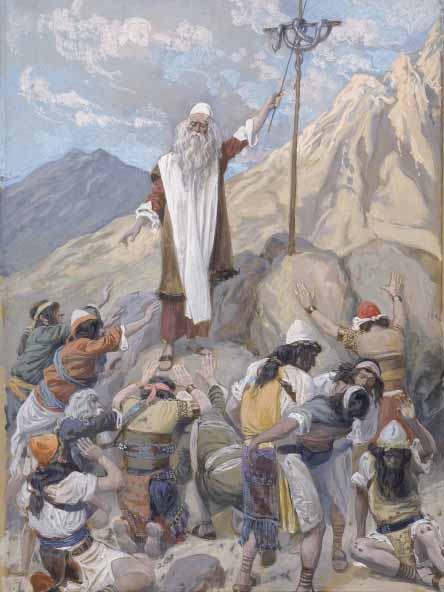
The readings for the Second Sunday of Lent can be found here.
Our first reading today from the book of Genesis is one of the most famous in Scripture. The story of Abraham almost sacrificing his son Isaac can be interpreted at the literal level as a lesson in doing the will of God without question. In this season of Lent, however, and with the other readings for this Sunday, we can see the importance of a typological interpretation – one that relates this story to a larger Christologocial narrative. Abraham did not sacrifice his own son, but God does sacrifice his own son. And the blessings promised to Abraham through his descendants are fulfilled in the significant descendant of Jesus through whom “all nations of the earth shall find blessing” (Gn. 22:18).
To reinforce this for us we have the gospel passage from Mark depicting the Transfiguration of Jesus. We see again the mountaintop setting, and Moses and Elijah appear as Jesus is transfigured, foreshadowing his resurrection from the dead. And the voice from the clouds says “This is my beloved Son. Listen to him” (Mk. 9:7). It’s perhaps not surprising that Peter, James, and John were a bit confused by this scene, not knowing what it all meant.
We, however, have this second reading from Romans that aptly summarizes everything for us:
If God is for us, who can be against us?
He who did not spare his own Son
but handed him over for us all,
how will he not also give us everything else along with him?Who will bring a charge against God’s chosen ones?
Romans 8:31b-34
It is God who acquits us, who will condemn?
Christ Jesus it is who died—or, rather, was raised—
who also is at the right hand of God,
who indeed intercedes for us.
On this Sunday of Lent, we may hear the familiar debate about whether or not we should observe our Lenten resolutions on Sunday. At the heart of this question is the recognition that we know how this story ends and cannot earn it. Even though we are at the beginnings of this season of Lent, we know what is coming on Easter Sunday. Our perspective allows us to read the story of Abraham not sacrificing Isaac while recognizing that God sacrificed his own son. We can read about Jesus’s transfiguration without sharing the confusion of Peter, James, and John because we know Jesus rises again after his passion and death.
Thus in the midst of a penitential season, we already share some of the joy of Easter, especially on this Sunday, which like all Sundays is devoted to the celebration of Jesus’s resurrection. Regardless of the choice to break or observe a Lenten penance, the spirit of confidence in Jesus’s victory over the grave is actually well-suited to the season of Lent. Every penance we undertake – whether abstinence from meat on Fridays, our penance after receiving the sacrament of Confession, or our voluntary Lenten resolutions – is embraced with the knowledge that Jesus has already won and invites us to share in that victory. Our penances unite us to the cross of Christ and his victory over it.
We sometimes fall into the problematic thinking that Lent is a season to grit our teeth and muscle through challenges while relying on our self-control and will power. In fact, when we undertake Lenten penances we are showing that God is for us, willing to give us everything we need and forgive every sin. We could never succeed in Lent if our penances had to meet a strict accounting for every one of our sins. Knowing that God longs to acquit us, however, we see that we cannot fail! What we recognize in Jesus’s life, passion, death, and resurrection, is that God’s mercy transcends, rather than contradicts justice. As we continue through this season on Lent, let us keep our eyes on Jesus, remembering that this season is not about us and our efforts so much as it is about Jesus.




